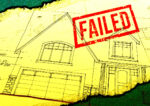The glacial home production across the Bay Area may get even icier.
A construction downturn in Greater San Francisco could result from higher interest rates on construction loans, rising labor and material costs, slowing demand from buyers and fears of a looming recession, the San Jose Mercury News reported.
“There already is a slowdown, but I think it will magnify itself in 2023,” Ken Rosen, chair of UC Berkeley’s Fisher Center for Real Estate and Urban Economics, told the newspaper. “A lot of developers may put projects on hold until construction costs come down.”
The decline may threaten an effort by Bay Area cities to meet a mandate by the state to approve a combined 441,000 homes in the next eight years, a 15 percent rise in the region’s inventory.
Most Bay Area cities and counties haven’t come close to meeting their individual targets in past decades.
Now housing experts and advocates contend that chronic underproduction — in part because many local officials have sought to limit growth — is at the root of the region’s astronomical rents and prices.
Mounting economic uncertainty will require governments to remove barriers to development and unlock more money for desperately needed affordable homes, Mathew Reed, policy director with Silicon Valley pro-housing group SV@Home, said.
Signs of a homebuilding decline are apparent in San Francisco, the East Bay and the Peninsula.
From the start of last year through November, the San Francisco metro area permitted slightly more than 10,000 homes, a 16 percent decline from the same period in 2021, according to the U.S. Census Bureau.
Greater San Jose metro area, which has seen a spate of new housing planned for its downtown, saw permits grow from 4,000 to 6,000 units.
But just because projects have construction permits, that doesn’t automatically mean they’ll be built. In San Francisco, several of the city’s biggest housing developments have stalled. Across the Bay in Concord, a 16,000-unit housing development – the Bay Area’s largest – is on hold.
The rising cost of borrowing has sent typical mortgage rates doubling over the past year, to 6.3 percent last week, boosting monthly home payments by thousands of dollars and pushing many would-be buyers out of the market.
In turn, developers are increasingly pulling back on new single-family homes and condos. Financing projects has become more expensive as rates for construction loans have jumped to around 6 percent.
“You have deals going to the sidelines because of interest rates,” Chris Neighbor, president of SummerHill Homes, which develops houses, condos and apartments throughout the South Bay, told the Mercury News.
Another roadblock is swelling material and labor costs since the start of the pandemic.
Inflation and supply chain issues for lumber and other materials, coupled with worker shortages, have sent hard costs soaring by 20 percent the past few years, though prices are now starting to stabilize, Neighbor said.
Also, the tens of thousands of local layoffs by tech companies such as Facebook, Twitter and Salesforce have a “big impact on housing demand,” giving developers pause, Dean Wehrli, a principal with John Burns Real Estate Consulting, said.
Growing concerns about a recession freezing the local real estate market this year only increase the uncertainty. At the same time, the slow recovery of the region’s downtowns from the pandemic has some developers questioning whether it makes sense to pursue projects in city centers, where rents mostly haven’t returned to pre-COVID prices.
“Why would you want to live in a downtown if it is dark and empty and boarded up?” Danny Haber, CEO of Oakland-based developer oWOW, asked the Mercury News.
Meanwhile, affordable housing developers rely on public subsidies that have become oversubscribed in recent years and could soon be on the chopping block.
Last week, Gov. Gavin Newsom, facing a projected $22.5 billion deficit, released a budget proposal calling for $350 million in reductions from the $11.2 billion set aside for affordable housing programs over the next few years.
— Dana Bartholomew
Read more


